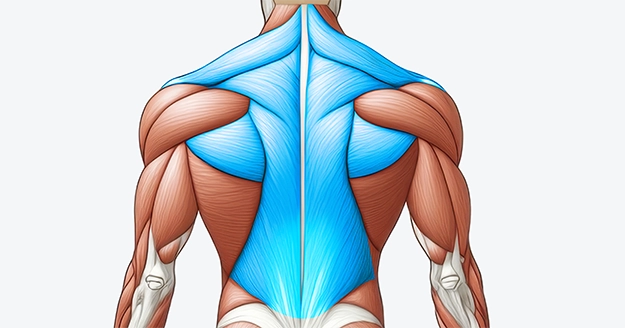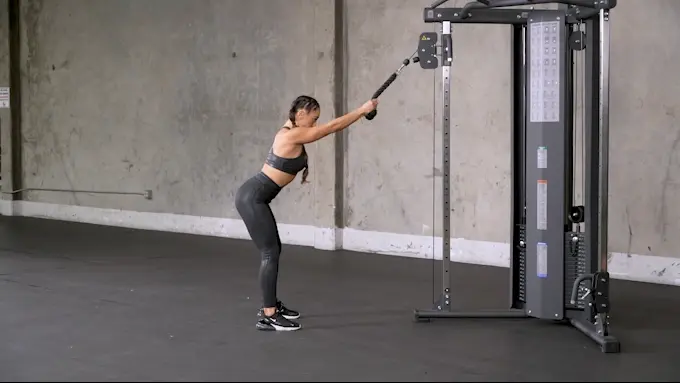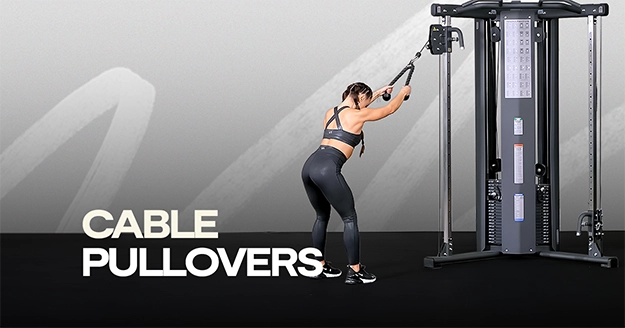Exercise Profile
Cable Pullovers Overview
The Cable Pullover is a multi-purpose strength training exercise that primarily targets the lats and, to some degree, the chest, triceps, and rear delts. This makes it an excellent addition to various workout routines aimed at building strength or enhancing muscle definition.
For beginners, the Cable Pullover offers a controlled movement that helps develop back strength and improve shoulder mobility. Athletes at a higher level can challenge themselves more by varying the weight or using variants such as single-arm pullovers.
Cable Pullovers can be integrated into your workout regimen in numerous ways. They work well as part of a back or upper body workout, can be included in a full-body routine to enhance overall strength, or serve as an effective finisher to maximize muscle engagement. To effectively target the lats and improve upper body strength, it’s essential to understand how to do cable pullovers correctly.

Cable Pullovers Instructions
Step 1: Attach the rope to the pulley on the highest setting and select a resistance. Grab the ends of the rope using both hands with palms facing each other. Walk backward at a comfortable distance.
Step 2: Stand hip-width apart and keep your spine neutral. Slightly bend your knees and push your hips out as you hinge forward. Engage your core and shoulder blades.
Step 3: Without bending your elbows, exhale as you pull the rope towards your thighs. Pause at the end of the motion and squeeze your lats.
Step 4: Inhale as you slowly return the cable to the starting position.

Common Cable Pullovers Variations
Pullovers are an effective way to build strength and sculpt your upper body, but mixing in different variations can provide new challenges and target specific muscles more effectively. Check out these popular Cable Pullover variations to elevate your workout routine:
Cable Pullovers Tips
- Keep your abs tight throughout the movement to prevent arching your back and to maintain stability.
- Focus on slow, controlled motions to maximally engage the lats and avoid using momentum.
- Keep your arms slightly bent to help you target your lats more effectively.
- Pick a weight that allows you to keep proper form and utilize your complete range of motion.
- Breathe in and exhale as you return the weight to the starting position.
Cable Pullovers Common Mistakes
- Overbending the elbows: Bending your elbows too much during the cable pullover shifts the focus to your triceps, taking emphasis away from the lats. It’s ideal to maintain a slight bend in your elbows—avoid locking them fully, but keep just enough to ensure proper lats’ engagement.
- Arching your back: Avoid letting your lower back arch as you hinge forward during the movement. Maintain a neutral spine alignment while maintaining an active core.
- Going too heavy: Using excessive weight can force you to rely more on momentum and less on form. Select a weight that is manageable and permits both optimal and complete range of motion.
Frequently Asked Questions
Which is more useful for a cable pullover: a rope or a bar?
Choosing between a bar or rope for Cable Pullovers depends on your goals. While a rope engages more muscles and allows for a greater range of motion, a bar offers stability for lifting heavier weights. Both are effective, so alternate them for variety in your workouts.
Is the pullovers cable effective for targeting the chest?
Yes, the pullover effectively targets the chest. While it mainly works the lats, it also engages the costal pectoral muscles, especially in variations like the Dumbbell Pullover.
What do cable pullovers work?
Cable pullovers mainly work the latissimus dorsi (lats), triceps, core, and lower chest (pectorals). This exercise helps shape these muscles and builds strength in the upper body.
Can pullovers serve as a substitute for pulldowns?
While pullovers target similar muscles as pulldowns, they shouldn’t fully replace them. Both exercises work in different planes of motion, so incorporating both can enhance your upper body workout.
Are pullovers beneficial for posture?
Yes, pullovers help with posture improvement by strengthening the lats, which helps with alignment and shoulder stability.
Post your post-workout selfies in IG and tag @trainestapp, #trainest, or DM them to us to get a shoutout on Trainest Stories!


